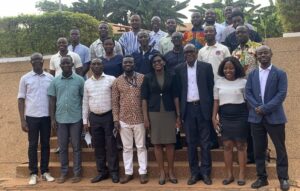Urgently halt soil salinization in Ghana – Dr Yeboah
 Dr Kwame Yeboah, Acting Director of Soil Research Institute (SRI) of the Council for Scientific and Industrial Research (CSIR), has stressed the need for urgent national actions to halt increasing soil salinization and sodification.
Dr Kwame Yeboah, Acting Director of Soil Research Institute (SRI) of the Council for Scientific and Industrial Research (CSIR), has stressed the need for urgent national actions to halt increasing soil salinization and sodification.
Soil salinization is the process of accumulating soluble salts in the soil whereas sodification is accumulation of sodium on clay exchange sites.
Irrigation with water that has a high salt content dramatically worsens the problem.
Soil salinization and sodification are major soil degradation processes, threatening ecosystem services and are recognized as being among the oldest problems at a global level for agricultural production, food security and sustainability in arid and semi-arid regions.
This situation is largely blamed on insufficient annual rainfall to flush accumulated salts from the crop root zone.
According to Dr Yeboah action against salination and sodification has become necessary to help boost soil productivity and ensure improvement in agricultural production in the country.
Dr Yeboah, who was speaking at the 2021 World Soil Day at Kwadaso in Ashanti Region, indicated that salinity affected crop production greatly, adding that some farmers could lose their whole crop farm due to salinity.
“If you go to most rice-growing areas in Ghana like Afife, Anloga, Ada, and other areas along the coast, there is a lot of salinity problem affecting crop production,” he stated.
This year’s celebration, which was on the theme: “Halt Soil Salinization, Boost Soil Productivity,” was organized by the Soil Scientists Society of Ghana (SSSG) to create awareness on problems associated with soil management and productivity in the country.
Dr Yeboah said the use of poor-quality water in some irrigation sites had led to the accumulation of salt, leaving patches of salt on the soil surface, which were detrimental to crop production.
He, however, said there were means to prevent, manage and rehabilitate salt-affected soils to be able to work in harmony with nature.
They include conserving natural ecosystems prone to salinity and sodicity, sustainable management of soil and water, application of appropriate irrigation practices and use of adapted (salt-tolerant) crops.
Other interventions are the application of enough high-quality non-saline water that was low in sodium ion to leach salts out of the profile as well as good drainage on saline soils.
Dr Yeboah pointed out that healthy soils constituted the foundation for agricultural development, ecosystem functions and food security and hence, were key to sustaining life on earth.
The sustainability of soils was key to addressing the pressures of a growing population and with that recognition, advocacy and support for promoting sustainable management of soils could contribute to healthy soils, stable and sustainable use of ecosystems and a food-secure world, he noted.
Dr Yeboah called on the SSSG to become nationally conspicuous, championing and effectively contributing to the agenda to address soil-related problems in Ghana.
They should also encourage members to author tailored soil focused textbooks and other educational materials for students, practitioners and policy makers to inspire soil science education, research and outreach in Ghana.
Dr Francis Tetteh, President of the SSSG, said the Society was working with the Crop Research Institute to identify salt-tolerant crops but for now, there were some vegetables and rice varieties, as well as shallots that were salt tolerant.
Cassava and the other forest crops were not salt-tolerant, salinization affected the productivity of the soil and the growth of such crops.
Source: GNA
